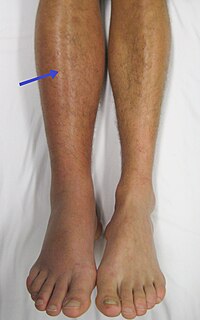
Photo from wikipedia
Thromboembolic events after total joint arthroplasty are potentially devastating complications. This study evaluated the efficacy of 4 different anticoagulants in preventing deep venous thrombosis and pulmonary embolism after total joint… Click to show full abstract
Thromboembolic events after total joint arthroplasty are potentially devastating complications. This study evaluated the efficacy of 4 different anticoagulants in preventing deep venous thrombosis and pulmonary embolism after total joint arthroplasty. The demographics and anticoagulant use (warfarin, enoxaparin, and aspirin with and without outpatient mechanical pumps) for patients who underwent primary unilateral total joint arthroplasties performed by a single surgeon from January 2013 to October 2014 were retrospectively reviewed. All patients underwent lower extremity ultrasound at the 3-week postoperative visit. A total of 613 primary unilateral total joint arthroplasties met the study inclusion criteria. There were 288 primary total knee arthroplasties and 325 primary total hip arthroplasties. The patients were 62.2% female, having a mean age of 67.6±10.6 years and a mean body mass index of 30.2±5.9 kg/m2. There were 119 patients in group 1 (aspirin alone), 40 patients in group 2 (aspirin plus pumps), 246 patients in group 3 (warfarin), and 208 patients in group 4 (enoxaparin). The overall 3-week symptomatic and asymptomatic deep venous thrombosis and symptomatic pulmonary embolism rates in the entire cohort were 5.7% and 0.3%, respectively. The venous thromboembolism rate was significantly affected by the anticoagulant of choice (P<.01). Compared with aspirin alone, warfarin decreased the risk of venous thromboembolism (P<.01). Increasing age led to increased risk of venous thromboembolism (P=.05). This study indicated that aspirin chemoprophylaxis alone was not as efficacious as warfarin and enoxaparin in preventing asymptomatic and symptomatic venous thromboembolism found during routine postoperative surveillance with lower extremity ultrasound. Aspirin alone may be inadequate and should be augmented with an outpatient mechanical pump as part of multimodal prophylaxis. [Orthopedics. 2019; 42(1):48-55.].
Journal Title: Orthopedics
Year Published: 2019
Link to full text (if available)
Share on Social Media: Sign Up to like & get
recommendations!